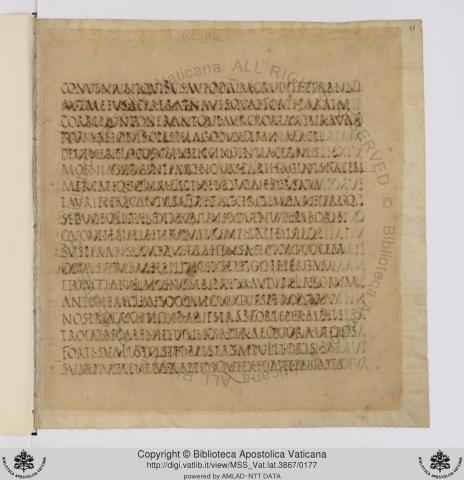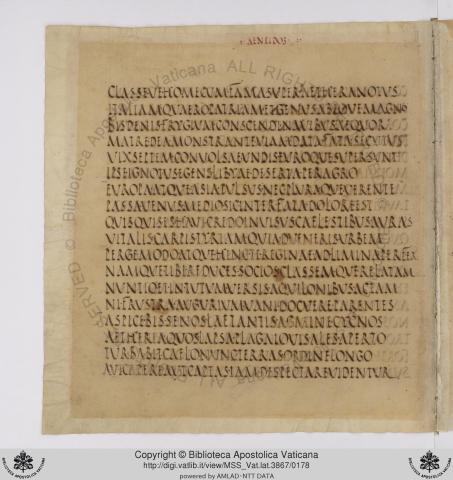CORE VOCABULARY
ō: (interj. expressing joy, grief, astonishment, desire, or indignation), O! oh! ah! w. voc., 2.281, et al.; w. sī and the subj., oh that, 11.415; sometimes placed after the word to which it relates, 2.281.
orīgō, inis, f.: a source, origin, beginning, 1.372; descent, lineage, birth, 1.286; source, root, founder, 12.166. (orior)
annālis, e.: adj. (annus), pertaining to years, or lasting through a year; subst., m., annalēs, ium, annals, records; story, history, 1.373.
vesper, eris or erī, m.: the evening; the evening star; the west, 5.19; personif., Vesper, Hesperus, 1.374, et al.
Olympus, ī, m.: Olympus, the name of several mountains in Greece and Asia Minor, the most famous of which was Mount Olympus in the northeastern part of Thessaly; the home of the superior gods; heaven, Olympus, 1.374; referring to the gods, 8.533.
Trōia, ae, f.: 1. Troy, the capital of the Troad, 2.625, et al. 2. A city built by Helenus in Epirus, 3.349. 3. A part of the city of Acesta in Sicily, 5.756. 4. The name of an equestrian game of Roman boys, 5.602.
Libycus, a, um: (adj.), Libyan, 1.339, et al.; subst., Libycum, ī, n., the Libyan or African sea, 5.595.
appellō, pulī, pulsus, 3, a.: to drive to; bring, convey to, 1.377; draw up to, moor on the shore, 7.39. (ad and pellō)
ōra, ae, f.: a margin, border, 12.924; coast, shore, 3.396; region, 2.91; rim, extremity, 10.477; pl., outline, compass, 9.528.
Aenēās, ae, m.: 1. A Trojan chief, son of Venus and Anchises, and hero of the Aeneid, 1.92. 2. Aenēās Silvius, one of the Alban kings, 6.769.
Penātēs, ium, m.: gods of the household; hearth-, fireside gods, 2.514, et al.; tutelary gods of the state as a national family, 1.68; (fig.), fireside, hearth, dwelling-house, abode, 1.527. (penus)
Ītalia, ae (Ī by poetic (epic) license), f.: Italy, 1.2, et al.
Iuppiter, Iovis, m.: Jupiter, son of Saturn and Rhea, and king of the gods, 1.223; Iuppiter Stygius, Pluto, 4.638.
bis: (adv.), twice, 1.381. (in composition bi-)
dēnī, ae, a: (adj. num. distrib.), ten by ten; ten each; (as cardinal), ten, 1.381.
Phrygius, a, um: Phrygian, Trojan, 1.381; subst., Phrygiae, ārum, f., Phrygian or Trojan women, 518. (Phryx)
cōnscendō, scendī, scēnsus, 3, a. and n.: to ascend, climb, 1.180; mount, 12.736; embark on, 1.381. (com- and scandō, climb)
mōnstrō, āvī, ātus, 1, a.: to show, point out, indicate, 1.444; inform, tell, 1.321; direct, incite, 9.44; ordain, appoint, prescribe, 4.636. (mōnstrum)
septem: (num. adj.), seven, freq.
convellō, vellī, vulsus, 3, a.: to pull violently; pluck, tear, pull up, 3.24; wrench forth, 12.774; cut off, 6.148; p., convulsus, a, um, rent, shattered, 1.383; convulsed, 5.143.
Eurus, ī, m.: the southeast wind, 1.85, et al.; wind, 1.383, et al.
supersum, fuī, esse, irreg., n.: to be over; to be left, remain (separated by tmesis), 2.567; survive, 8.399.
ignōtus, a, um: (adj.), unknown, 1.359; strange, 5.795; not well known, but little known, 11.527.
egēns, entis: destitute, needy, necessitous, helpless, 4.373. (egeō)
Libya, ae, f.: Libya; northern Africa; by poetic license, Africa, 1.22, et al.
dēserta, ōrum, n.: desert, waste places, 1.384; haunts, 7.404.
peragrō, āvī, ātus, 1, n. and a.: to go through fields or lands; to roam, travel; traverse, 1.384. (per and ager)
Eurōpa, ae, f.: 1. Europa, the daughter of Agenor, king of Phoenicia, borne by Jupiter over the sea to Crete. 2. Europe, 1.385.
Āsia, ae, f.: 1. Asia, a town of Lydia, near the river Cayster. 2. Asia Minor; Asia, 7.224, et al.
nec or neque: (adv. and conj.), and not; neither, nor, 1.643, et al.; in prohibition, 3.394, et al.; neque (nec) — neque (nec), neither — nor, 5.21, et al.; nec — et, or -que, may be rendered neither — nor, 12.801; 2.534; nec nōn, and also, nor less, 6.183; nec nōn et, and also, 1.707.
Venus, eris, f.: Venus, goddess of love and beauty, identified by the Romans with Aphrodite, daughter of Jupiter and Dione, 1.411, et al.; (meton.), love, lust, 6.26.
interfor, fātus sum, 1, dep. a.: to speak between; interrupt, 1.386.



